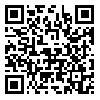Volume 14 -
IJMEHM 2021, 14 - : 1-13 |
Back to browse issues page
Download citation:
BibTeX | RIS | EndNote | Medlars | ProCite | Reference Manager | RefWorks
Send citation to:



BibTeX | RIS | EndNote | Medlars | ProCite | Reference Manager | RefWorks
Send citation to:
Rezaeean S M, Kazemi Gelian Z, Kazemi Gelian G, Abbasi Z, Salari E, Tabatabaeichehr M. Study of Barriers to Professional Ethics in Midwifery Clinical Care from Midwives’ Viewpoints in Hospitals Specializing in Obstetrics and Gynecology in North Khorasan Province in 2018. IJMEHM 2021; 14 :1-13
URL: http://ijme.tums.ac.ir/article-1-6291-en.html
URL: http://ijme.tums.ac.ir/article-1-6291-en.html
Seyedeh Mahboobeh Rezaeean1 
 , Zahra Kazemi Gelian *
, Zahra Kazemi Gelian * 
 2, Ghasem Kazemi Gelian3
2, Ghasem Kazemi Gelian3 
 , Zohreh Abbasi4
, Zohreh Abbasi4 
 , Elahe Salari1
, Elahe Salari1 
 , Mahbubeh Tabatabaeichehr5
, Mahbubeh Tabatabaeichehr5 


 , Zahra Kazemi Gelian *
, Zahra Kazemi Gelian * 
 2, Ghasem Kazemi Gelian3
2, Ghasem Kazemi Gelian3 
 , Zohreh Abbasi4
, Zohreh Abbasi4 
 , Elahe Salari1
, Elahe Salari1 
 , Mahbubeh Tabatabaeichehr5
, Mahbubeh Tabatabaeichehr5 

1- Instructor, Department of Midwifery, Medical Faculty, North Khorasan University of Medical Sciences, Bojnurd, Iran
2- BSc in midwifery, Department of Midwifery, Medical Faculty, North Khorasan University of Medical Sciences, Bojnurd, Iran
3- Assistant Professor, Department of Mathematics, Islamic Azad University, Shirvan Branch, Shirvan, Iran
4- Assistant Professor, Department of Midwifery, Medical Faculty, North Khorasan University of Medical Sciences, Bojnurd, Iran
5- Instructor, Geriatric Care Research Center, Department of Midwifery, Medical Faculty, North Khorasan University of Medical Sciences, Bojnurd, Iran
2- BSc in midwifery, Department of Midwifery, Medical Faculty, North Khorasan University of Medical Sciences, Bojnurd, Iran
3- Assistant Professor, Department of Mathematics, Islamic Azad University, Shirvan Branch, Shirvan, Iran
4- Assistant Professor, Department of Midwifery, Medical Faculty, North Khorasan University of Medical Sciences, Bojnurd, Iran
5- Instructor, Geriatric Care Research Center, Department of Midwifery, Medical Faculty, North Khorasan University of Medical Sciences, Bojnurd, Iran
Abstract: (2368 Views)
Failure to follow professional ethics in midwifery will lead to harmful risks, including an increase in maternal and infant mortality. The aim of this study was to investigate the barriers to professional ethics in midwifery clinical care from midwives ’viewpoints in hospitals specializing in obstetrics and gynecology in North Khorasan province in 2018. This cross-sectional descriptive study was performed with the participation of 141 midwives working in specialized obstetrics and gynecology hospitals in North Khorasan province, using classified sampling. The data collection tool was a questionnaire consisting of two parts: demographic information and barriers to professional ethics, in three areas: environmental and managerial and personal care. Data were analyzed using SPSS software version 22 and descriptive and inferential statistics. From the perspective of midwives, all three categories of environmental factors (73.94%), personal care (64.66%) and management (64.97%) were among the barriers to professional ethics. The most important barriers to professional ethics in the managerial dimension are staff shortages (80%), in the environmental dimension, biological changes in the body during work shifts (85.2%) and in the personal dimension, dissatisfaction with basic needs, such as insufficient income or adequate rest in midwifery (80.9%), was. Given the importance of observing professional ethics and the issues and problems arising from non-compliance, it is suggested that managers and officials make the necessary planning by hospitals to remove the barriers mentioned by midwives.
Keywords: Professional ethics, Clinical care, Midwife, hospitals specializing in obstetrics and gynecology
Type of Study: Research |
Subject:
Medical Ethics
Received: 2020/08/26 | Accepted: 2021/03/7 | Published: 2021/03/21
Received: 2020/08/26 | Accepted: 2021/03/7 | Published: 2021/03/21
| Rights and permissions | |
 |
This work is licensed under a Creative Commons Attribution-NonCommercial 4.0 International License. |



